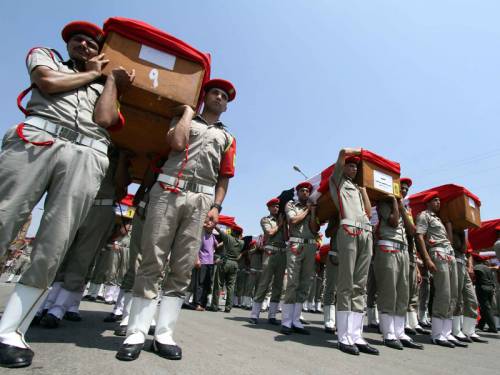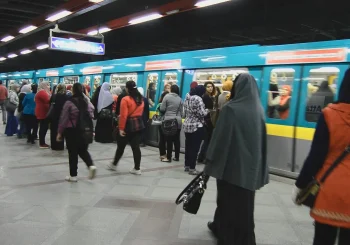It has been a week since an unanticipated attack on North Sinai by a terrorist group affiliated with the Islamic State left 17 young army conscripts dead, in the latest wave of violence to plague the province.
The group, which calls itself Sinai Province, attacked several checkpoints around the town of Sheikh Zuweid in the early hours of July 1st.
Yet, aside from conflicting reports on the number, there appeared to be a marked indifference towards the martyred soldiers as media attention shifted to the sheer number of terrorists taken out by the operation, the scale of the attack, or even the bulk of the confiscated artillery.
This attack comes as the latest in a series of nearly annual assaults on Egyptian troops in the Sinai Peninsula targeting military checkpoints close to the Egyptian border, as the country commences its war on terror.
In August 2012, which coincided with the holy month of Ramadan that year, an attack on the Rafah border crossing by unknown assailants left 16 young soldiers dead at the call of the Maghrib prayer.
The incident sparked public outcry, with many public figures demanding that President Mohamed Morsi would be held accountable.
The young soldiers’ funeral was publicly broadcast with both Morsi and Tantawi -Defense Minister at the time of the incident- at the forefront.
Fast forward to two years later, around 31 soldiers were killed in a similar attack on Sheikh Zuweid that involved heavily armored vehicles and weapons in what was then the biggest attack on the province since Morsi’s ouster.
Public and private media kept a watchful eye on the situation, again covering the soldiers’ funeral processions, calling in security experts for commentary following the state of emergency announced by President Abdel Fattah al-Sisi in the region, and joined together to condemn the brutal killing of the young men.
However, the media response to this year’s attacks unfolded rather differently.
The army circulated its own reportage through spokesman Mohamed Samir Abdelaziz’s official Facebook page that showed a visual demonstration of the attack. The video also contained several statements from injured survivors mourning the loss of their friends.
Egyptian President Abdel Fattah El Sisi visited the province on Saturday to inspect the situation and gave a 30-minute long address to the nation in full military garb showing solidarity with the armed forces.
In his address, El Sisi reassured the Egyptian people that conditions were stable and under control, and gave thanks to the military, the police, and the people of Sinai.
Despite the events, scheduled Ramadan programming resumed as normal. However, segments from the speech were broadcast on several channels’ news bulletins that evening.
A local website reported that Mohamed Hany, president of popular Egyptian network CBC, said: “the primary goal of [these] terrorist acts is to stop all economic and media activity, and interrupting [our] transmission would help terrorist groups achieve their goals.”
This, however, comes in stark contrast to the responses of almost all public and private television channels to the death of Egyptian General Prosecutor Hisham Barakat who was assassinated after the detonation of a car bomb that targeted his convoy two days prior to the Sinai attacks.
Following Barakat’s assassination, television channels interrupted their usual Ramadan programming to display a black screen with a message of mourning, while some even aired specials hosted by their normal talk show hosts to discuss the incident.
To this end, Hany said, “[CBC] declared mourning after the killing of the general prosecutor but repeated terrorist attacks will make the act declaring mourning, in itself, as implicitly meeting the terrorists’ objective.”
Meanwhile the government has also imposed a gag order on all local media from further investigating Barakat’s assassination until all official investigations are complete.
As attacks on the Sinai Peninsula continue and Egypt’s war on terror enters its third year, it remains to be seen whether the frequency of the insurgency has somewhat desensitized media organizations or whether it is simply important to converge around a more unified narrative.







Comments (0)